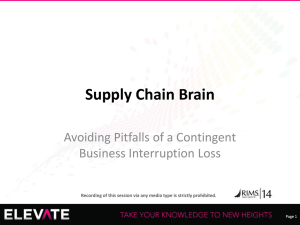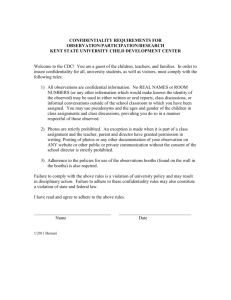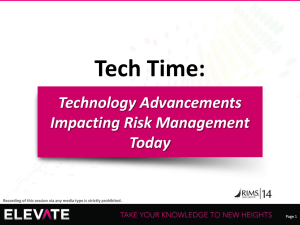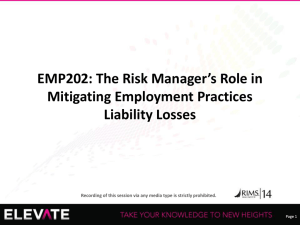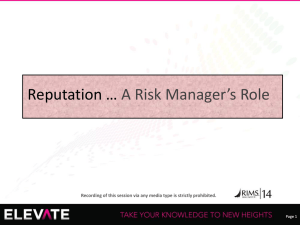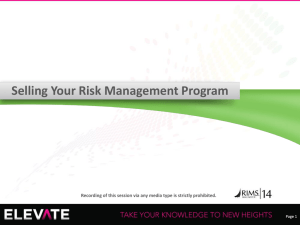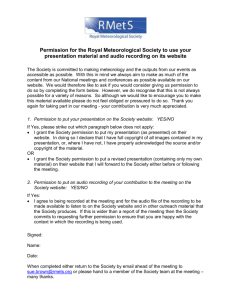Red Dog – Loss Control Measures
advertisement
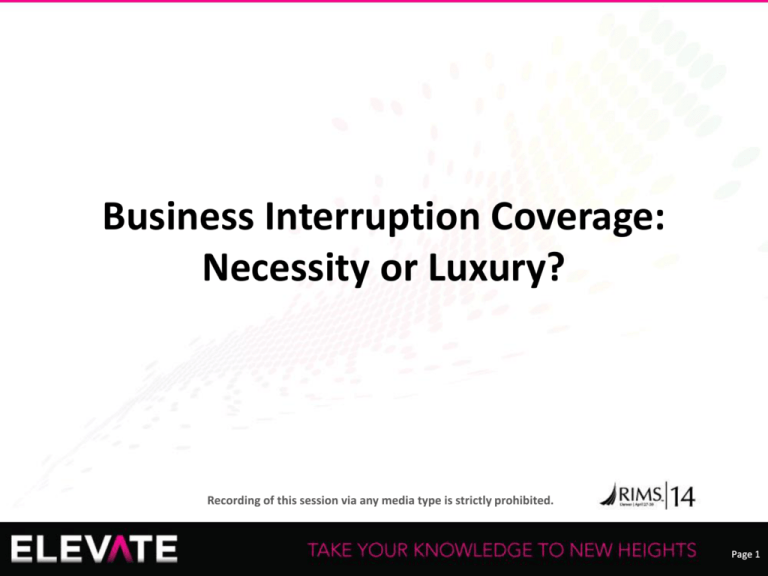
Business Interruption Coverage: Necessity or Luxury? Recording of this session via any media type is strictly prohibited. Page 1 Speakers Barry Mitchell – Director, Risk Security & Loss Control, Teck Resources Barry has been in the Security and Risk Management indusrty for over 20 years, as a private business owner; with a global insurance provider; and now with Teck Resources Limited. Thomas K. Varney – Regional Manager, Allianz Risk Consulting N. America Tom is responsible for delivering client directed Loss Control services for six Lines of Business (Property, Marine, Liability, Engineering, Energy & Aviation) and leading more than 50 risk engineers throughout Canada, United States & Mexico as part of a global network of 250+ engineers. He joined Allianz Global Corporate & Specialty in 2011. Recording of this session via any media type is strictly prohibited. Page 2 What to Expect • • • • • This will not be a business interruption wording review. It is about business resiliency & recovery! Information is key (data collection & greater transparency). A better overall understanding of BI and CBI exposures. Sometimes creativity is required when addressing BI and CBI exposures. Risk assessment requires an analysis process that includes both the inside and outside exposures. Recording of this session via any media type is strictly prohibited. Page 3 Teck’s Corporate Risk Management Philosophy • Risk is an inherent aspect of our business • Accountability for management of risk may cross lines of responsibility • Some risks are common to all operations while others may have unique risks • Risk events may have local implications or may impact the whole company • Risks can be categorized as internal within our control or external as determined by factors and events beyond our direct control Recording of this session via any media type is strictly prohibited. 4 Page 4 Red Dog Operations • Large scale, low cost zinc production • 68 degrees north latitude in Alaska • 50 miles inland from port • Air access only • Fully self-supporting • Sole reliance on selfgenerated power Recording of this session via any media type is strictly prohibited. 5 Page 5 Red Dog - History The first report of mineralization in the Red Dog area 1953 NANA selected the lands and proceeded to discuss mine development possibilities 1981 1970 Pilot and prospector, Bob Baker of Kotzebue, Alaska noticed a rusty alteration zone in Red Dog Creek 1982 Cominco Ltd. and NANA reached an agreement that led to the development of the mine. Cominco to lease the property from NANA operate the mine and market the concentrate ~20 year+ mine life, with potential to increase further 2014 Construction was completed 1989 2001 Teck acquired Cominco Recording of this session via any media type is strictly prohibited. 6 Page 6 Red Dog - Site Plan Recording of this session via any media type is strictly prohibited. 7 Page 7 Red Dog - Port Site Plan Recording of this session via any media type is strictly prohibited. 8 Page 8 Red Dog - Port • • Shallow water port Narrow shipping window Four months open water for shipping 1,350,000 wmt of concentrates in 100 day ice-free window shipped by bulk carrier to Canada, Asia, Europe and Australia Recording of this session via any media type is strictly prohibited. 9 Page 9 Red Dog – Foss Barges • Foss built two barges for lightering – Noatak and Kivalina. • Owned and operated by Foss, but only used for Red Dog Start of season, come up with supplies End of season, stored and maintained in Seattle • Barge lighterage system - to load ships at anchor 3 nautical miles off coast • 24-27 vessels per season - (35K to 95K wmt capacity each) Recording of this session via any media type is strictly prohibited. Page 10 Red Dog - Foss Barges Recording of this session via any media type is strictly prohibited. 11 Page 11 Red Dog - Foss Barges Recording of this session via any media type is strictly prohibited. 12 Page 12 Red Dog - Foss Barges Recording of this session via any media type is strictly prohibited. 13 Page 13 Red Dog – Barge Loss Effect • During a typical year, 350,000 – 700,000 wmt (from a total of 1,350,000 wmt) of concentrate would remain at site if lightering capacity was reduced to a single barge prior to mid-August • Not able to store concentrate outside for environmental reasons; therefore, after storage is full, would force a mine shutdown resulting in B.I. exposure Recording of this session via any media type is strictly prohibited. 14 Page 14 Red Dog – Barge Loss Effect • If we lose a barge, we have a variety of options: Keep loading with the remaining barge Attempt to bring in a self-discharging vessel We have tried to insure B.I. through property program but due to treaty exclusions, property insurers cannot write hull coverage Recording of this session via any media type is strictly prohibited. 15 Page 15 Red Dog – Loss Control Measures • Essential spares, i.e. boom – contingency plan is in place in event of boom failure • Loading surveys • Tug surveys • Internal compartments’ condition survey • Regular maintenance program Recording of this session via any media type is strictly prohibited. 16 Page 16 Red Dog – Loss Control Measures Recording of this session via any media type is strictly prohibited. 17 Page 17 Red Dog – Loss Control Measures Recording of this session via any media type is strictly prohibited. 18 Page 18 Red Dog – Loss Control Measures •The tug captain has the final say on whether they will operate. Ship captain will also have say in whether barge can come alongside ship •Weather conditions Suitable port facility and ship Monitored daily and for as much as 36 hours in advance Sea, and swell conditions Back-up plan if weather turns Recording of this session via any media type is strictly prohibited. 19 Page 19 Red Dog – Risk Transfer • No traditional BI solution • Trade Disruption Policy – Marine Markets Hull and weather perils Additional costs to charter similar barges Additional expenses to stockpile Demurrage costs Recording of this session via any media type is strictly prohibited. Page 20 Other Potential BI Triggers • • • • • • • • Reputation, loss of social license Country risk Union trends Trends re. human rights, slavery, etc. Natural disasters Supply chain Procurement No business no community? Recording of this session via any media type is strictly prohibited. Page 21 The Ripple Effect! •Research statistics •Marketplace situation •Some potential solutions •Is business interruption coverage a necessity or a luxury? Source: AGCS Managing Disruptions Supply Chain Risk: an insurers perspective Disruption in one part of the world is rarely contained to that area! Recording of this session via any media type is strictly prohibited. 22 Page 22 Global Economy • Disruption preparation • Lack of transparency • Key supplier exposures Recording of this session via any media type is strictly prohibited. Source: MunichRe, Page 23 Disruption Preparation Recording of this session via any media type is strictly prohibited. Source: MunichRe, NatCatSERVICE Page 24 Supply Chain Optimization (Procurement) • Risk management involvement in procurement process • Global interdependencies • Geographical concentrations • Infrastructure challenges Source: AGCS Managing Disruptions Supply Chain Risk: an insurers perspective Recording of this session via any media type is strictly prohibited. Page 25 Increasing Global Interdependencies Source: http://supplychainlogistics.wordpress.com/?s=boeing Recording of this session via any media type is strictly prohibited. Source: http://supplychainlogistics.wordpress.com/?s=boeing Page 26 Geographical Concentration of Production • Country’s shares in silicon and computer industry (% of global suppliers) Silicon wafers Semiconductors Computer hard drives 23% 45% 60% Thailand Japan World Source: IHS Global Insight Recording of this session via any media type is strictly prohibited. Source: IHS Global Insight Page 27 Global Infrastructure Challenges Quality of electricity supply by country, 2010 Source: World Economic Forum Legend: 1 = insufficient and suffers frequent interruptions 7 = sufficient and reliable Recording of this session via any media type is strictly prohibited. Source: World Economic Forum Page 28 Insurance Coverage & Example Interdependencies versus Contingent Business Interruption (CBI) Coverage for losses effecting other locations within the supply chain Standard Business Interruption covers loss of income suffered after physical damage at same facility Interdependency covers the “intercompany” production streams • Suspension of operation at one facility of the insured caused by • a physical loss or damage at another facility • Coverage normally up to policy limit CBI covers the “external” production streams • Suspension of operation at one facility of the insured caused by • a physical loss or damage at a facility of a supplier or customer • Service Interruption follows the same pattern • Coverage based on sublimit Source: AGCS Managing Disruptions Supply Chain Risk: an insurers perspective Recording of this session via any media type is strictly prohibited. Page 29 Business Interruption & Accumulation Risk • BI loss in 2013 Fire severely damages a chemical plant in Europe Plant produced a large quantity of the world’s supply of a chemical necessary for a compound used with various components in the automobile industry Estimated business interruption: ― 3 months ― Major impact felt by numerous automobile manufacturers Source: Munich Re Even on a single location basis, one can have a combined loss and thus accumulation, but a natural peril multiplies this impact! © Copyright Allianz Global Corporate & Specialty AG 16.01.2013 Recording of this session via any media type is strictly prohibited. Page 30 How Business Continuity Management Can Mitigate Losses • The Players Silicon wafer supplier Computer manufacturer A Semicon manufacturer B • Chain of Events Earthquake Extensive damage to wafer manufacturing facility Wafer supplier unable to meet procurement obligations © Copyright Allianz Global Corporate & Specialty AG 16.01.2013 Recording of this session via any media type is strictly prohibited. Page 31 The Consequences Company A Company B • Risk management processes had identified wafer manufacturer as critical • Risk management processes had identified wafer manufacturer as critical • BCP identified secondary supplier • BCP identified secondary supplier • Secondary supplier located in the same region • Secondary supplier located in Canada • Secondary supplier had also suffered major damage • Within a week the company was able to state that the events did not have a material impact on production • Sourcing from an alternative supplier took more than a month • Reported a 10% rise in profit and increased market share 2% in Q2 © Copyright Allianz Global Corporate & Specialty AG 16.01.2013 • Loss of US$100mn and lost 3% market share Recording of this session via any media type is strictly prohibited. Page 32 How Business Continuity Management Can Mitigate Losses Lessons Learned • Having identified risks in a BCP does not always mean that the risks are adquately mitigated • Catastrophic events and accumulation potential should be part of BCM risk assessments • Making sure a continutiy plan rises to the proper level within an organization to assure proper supply chain resilency Assessment of BCM risk identification & resilience strategies should have highlighted the weaknesses of company A © Copyright Allianz Global Corporate & Specialty AG 16.01.2013 Recording of this session via any media type is strictly prohibited. Page 33 Where Insurance Can Support The Risk Assessment Site visits Supplier assessment Risk assessment key critical suppliers Scheduled assessments identifying local exposures & critical suppliers CBI Meetings Discussion on overall supplier dependencies & mitigations More holistic approach required, clearly focusing on key risks! © Copyright Allianz Global Corporate & Specialty AG 16.01.2013 Recording of this session via any media type is strictly prohibited. Page 34 Conclusion • Information is key (better data and greater transparency) • Risk analysis should include both inside and outside exposures • So is BI a necessity or a luxury? It depends! Regardless of the choice made both approaches require doing your homework and thinking outside the box are both essential to assure continued business resiliency © Copyright Allianz Global Corporate & Specialty AG 16.01.2013 Recording of this session via any media type is strictly prohibited. Page 35 Questions & Final Comments Recording of this session via any media type is strictly prohibited. Page 36 Please complete the session survey on the RIMS14 mobile application. Recording of this session via any media type is strictly prohibited. Page 37
